Liquor-soaked fruits last for years because alcohol creates a toxic barrier against harmful microorganisms while replacing water in fruit cells. When you soak fruit in alcohol (typically 70% solution), it kills bacteria and creates an acidic, anaerobic environment that prevents spoilage. The alcohol actually hardens proteins in the fruit and maintains its shape, creating a protective microenvironment that keeps the fruit stable. You'll find this preservation method works best when fruits stay completely submerged in airtight glass containers. Beyond preservation, this process transforms both the fruit's flavor and nutritional profile in fascinating ways.
The Science Behind Alcohol Preservation
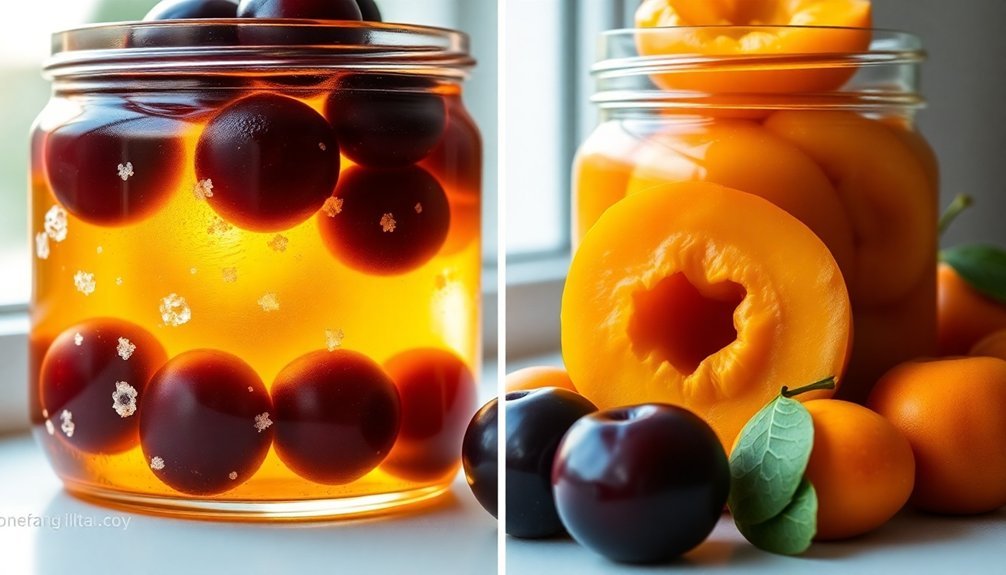
Inside of alcohol-preserved specimens lies a fascinating world of chemical interactions. When you soak fruit in liquor, you're initiating a complex preservation process that protects the fruit from decay while maintaining its structural integrity.
The alcohol acts as a toxic barrier against microorganisms that would typically cause spoilage, effectively stopping bacteria and mold in their tracks. This preservation technique has been used since the 1600s to successfully protect biological materials.
You'll find that the concentration of alcohol plays a significant role in preservation. A 70% alcohol solution provides an ideal balance – it's strong enough to kill microorganisms but contains enough water to prevent the fruit from becoming overly dehydrated and shriveled.
The alcohol works by replacing water in the cells while simultaneously hardening proteins, which helps maintain the fruit's shape. It also halts enzymatic reactions that would normally lead to degradation.
When you preserve fruit in alcohol, you're creating a protective microenvironment that can keep your fruit stable for years. The alcohol penetrates the tissue, dehydrating it partially while fixing the cellular structure.
This preservation method doesn't just store your fruit – it transforms it into a stable, long-lasting ingredient that you can use in various culinary applications.
Fruit and Alcohol Absorption Process
When you soak fruit in alcohol, various factors influence the absorption process and final results. The fruit's physical structure and water content play significant roles, with watermelon and cucumber absorbing alcohol most readily due to their porous nature and high water content. You'll find that fruits with skins, like cherries and grapes, can withstand longer soaking periods compared to skinless varieties. The advanced vacuum chamber technique offers a modern approach to fruit infusion compared to traditional soaking methods.
| Fruit Type | Absorption Level | Soaking Duration | Best Liquor Choice |
|---|---|---|---|
| Watermelon | Very High | 2-3 hours | Clear spirits |
| Grapes/Apples | Medium | Up to 1 week | Any type |
| Oranges | Low | 3-4 days | Clear spirits |
| Cherries | Medium-High | Up to 2 weeks | Any type |
You can speed up the absorption process using vacuum infusion, which removes air from the fruit and allows alcohol to penetrate more effectively. During this process, you'll notice bubbles escaping from the fruit, indicating successful infusion. For traditional soaking methods, remember that firmer fruits can soak longer than softer ones, and clear liquors typically work better for extended soaking periods. The temperature matters too – keep it cool when using darker spirits to maintain ideal flavor profiles.
Flavor Development Over Time
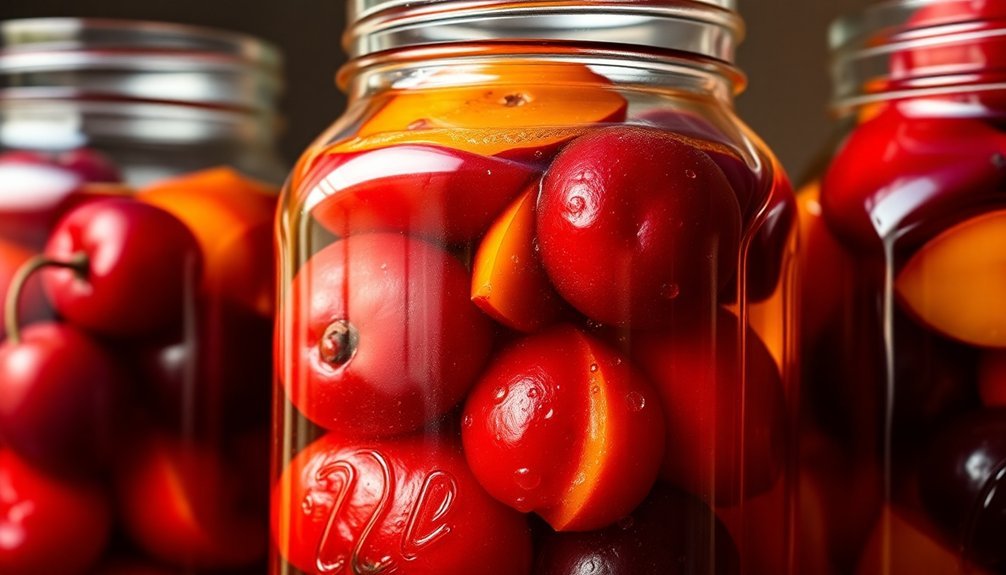
When you soak fruits in alcohol, you'll notice complex chemical interactions happening between the fruit's natural compounds and the liquor itself.
Your soaking duration directly affects how thoroughly these compounds merge, with softer fruits like strawberries releasing their aromatics quickly while harder fruits like cherries need months or even years to fully develop. Using higher proof liquor helps preserve fruits better during extended soaking periods.
You can monitor this gradual transformation through regular tastings, as the fruit's flavors steadily infuse into the alcohol while the alcohol simultaneously saturates the fruit.
Complex Chemical Interactions
Through the magic of time and chemistry, liquor-soaked fruits undergo fascinating flavor transformations as they age. When you soak fruits in alcohol, you're initiating a complex series of chemical reactions that continue to evolve over months and even years. These interactions involve enzymes, acids, sugars, and volatile compounds that work together to create unique flavor profiles.
The alcohol acts as both a preservative and an extraction medium, pulling flavors from deep within the fruit's cellular structure while creating new compounds through chemical reactions. You'll notice that the taste becomes more complex and refined over time, as the harsh edges of the alcohol soften and blend with the fruit's natural essences.
- The fruit's enzymes continue to work slowly in the alcohol, breaking down complex molecules into simpler, more flavorful compounds.
- Acids from the fruit interact with alcohol molecules to form esters, creating new aromatic compounds.
- Natural fruit sugars dissolve and blend with the alcohol, contributing to a smoother taste.
- Volatile compounds that would normally evaporate are trapped and preserved by the alcohol.
- Chemical bonds between different flavor molecules create entirely new taste experiences that weren't present in either the original fruit or alcohol.
Aromatic Compounds Merge Gradually
The flavor-melding process in alcohol-soaked fruits happens gradually and predictably over time. When you soak fruits in alcohol, you're initiating a complex dance of flavor compounds that can take weeks or months to fully develop. During this period, the alcohol acts as both a preservative and an extractor, pulling aromatic compounds from the fruit while preventing spoilage.
You'll notice that time plays an essential role in how these flavors develop. The fruit's enzymes, including lipoxygenase and alcohol acetyltransferase, continue working even in storage, contributing to aroma development. The ethylene pathway, though slowed by alcohol, still influences how flavors merge and mature.
Storage conditions considerably impact your final product's quality. You'll want to keep your alcohol-soaked fruits away from heat and sunlight to maintain their flavors.
When you add sugar syrup to the mix, you're not just sweetening the liqueur – you're creating a more complex flavor profile that needs time to integrate properly. With proper storage, these preserved fruits can maintain their distinctive flavors for up to a year, though you might notice some gradual changes in color and intensity over time.
Proper Storage Methods Matter
Storing liquor-soaked fruits properly can mean the difference between delicious, well-preserved treats and spoiled, wasted ingredients.
You'll need to focus on both the environment and container selection to guarantee your fruits maintain their quality over time. Place your infusions in a cool, dry area away from direct sunlight, or use the refrigerator for extended storage periods, especially with fruitcakes.
Your choice of container plays a vital role. Select airtight glass jars or containers, making sure they're clean and sterilized before use.
You'll want to keep the fruit completely submerged in alcohol by at least an inch, checking periodically to maintain this level. The high alcohol content serves as a natural preservative, but you'll need to monitor the mixture regularly.
- Glass containers filled with colorful fruits bobbing in clear spirits
- Dark amber bottles lined up in a cool pantry corner
- Fruitcakes wrapped in liquor-soaked cheesecloth inside sealed containers
- Mason jars with tight-fitting lids containing plump, alcohol-infused cherries
- Clear glass containers showing perfectly submerged fruit beneath the spirits
Remember to stir or shake your mixture periodically and watch for any signs of spoilage.
You'll need to add more liquor occasionally to maintain proper preservation levels.
Natural Fermentation Benefits
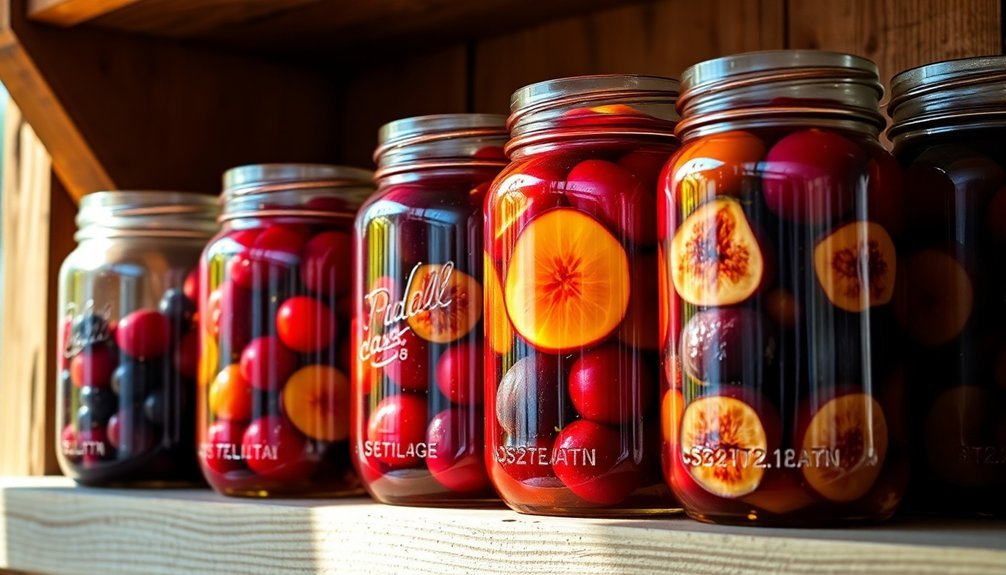
While proper storage maintains your liquor-soaked fruits' quality, natural fermentation takes preservation even further by offering remarkable benefits. When you soak fruits in alcohol, you're creating an environment that naturally preserves food through fermentation, similar to how sauerkraut and cheese are preserved.
The process creates an acidic, anaerobic setting that prevents harmful bacteria from growing, particularly those that could produce dangerous toxins.
You'll find that fermentation doesn't just preserve your fruits – it actually enhances their nutritional value. The process breaks down food components, making nutrients more accessible to your body and sometimes even creating new beneficial compounds.
You're also getting the advantage of probiotics, which support your digestive health and boost your immune system.
What's particularly appealing about this preservation method is its sustainability. You won't need electricity or special equipment to maintain your liquor-soaked fruits, making it an environmentally friendly choice.
The process is simple, cost-effective, and allows you to store fruits for extended periods without compromising their quality or nutritional benefits, all while supporting your gut health through natural fermentation.
Creative Uses for Preserved Fruits
Preserved fruits offer a versatile playground for culinary creativity, extending far beyond their traditional uses as simple snacks or garnishes.
You'll find these preserved delights transforming everyday dishes into gourmet experiences, whether you're baking, cooking, or mixing drinks. From enhancing savory marinades to creating decadent desserts, preserved fruits bring depth and complexity to your culinary endeavors.
Consider these innovative applications for your preserved fruits:
- Blend them into cocktails instead of sugary syrups, creating sophisticated drinks with natural fruit flavors.
- Incorporate them into marinades for meats, combining them with soy sauce or balsamic vinegar for a sweet-savory balance.
- Transform breakfast staples by mixing them into pancake batter or heating them as a luxurious topping for waffles.
- Create elegant layered desserts by spreading them between slices of angel food cake.
- Elevate your salads by incorporating them into homemade vinaigrettes with olive oil and herbs.
The possibilities extend into both sweet and savory territories, making preserved fruits an invaluable ingredient in your kitchen.
They're particularly useful in baking, where they add moisture and flavor to muffins, quick breads, and pastries while reducing the need for additional sweeteners.
Frequently Asked Questions
Can Pregnant Women Consume Liquor-Soaked Fruits Safely?
You shouldn't eat liquor-soaked fruits while pregnant, as there's no safe amount of alcohol during pregnancy. Even small amounts can harm your baby's development and increase risks of birth defects.
What's the Minimum Alcohol Percentage Needed for Effective Fruit Preservation?
You'll need at least 15-20% alcohol content to preserve fruit effectively. If you're planning long-term storage, aim for higher percentages. Make sure you've completely submerged the fruit in the alcohol solution.
Which Fruits Should Never Be Preserved in Alcohol?
You shouldn't preserve fruits with toxic seeds or pits like cherries, plums, and peaches in alcohol. Also avoid unripe ackee, lychee, and star fruit, as alcohol can extract their dangerous compounds.
Do Liquor-Soaked Fruits Retain Their Nutritional Value Over Time?
You'll find that liquor-soaked fruits maintain most of their nutrients since alcohol preserves them without heat. While some vitamins may decrease over time, they'll retain more nutritional value than other preservation methods.
Can Homemade Alcohol-Preserved Fruits Be Sold Commercially?
You'll need proper licenses and permits to sell homemade alcohol-preserved fruits commercially. You must comply with FDA and TTB regulations, maintain strict food safety standards, and guarantee proper labeling for legal distribution.
In Summary
You'll find that alcohol-preserved fruits can last for years due to their unique preservation process. As the fruit absorbs the liquor, it creates an environment where bacteria can't thrive. When you store these treats properly in airtight containers and cool, dark places, they'll continue developing complex flavors. You can enjoy these versatile preserved fruits in desserts, cocktails, or on their own for years to come.

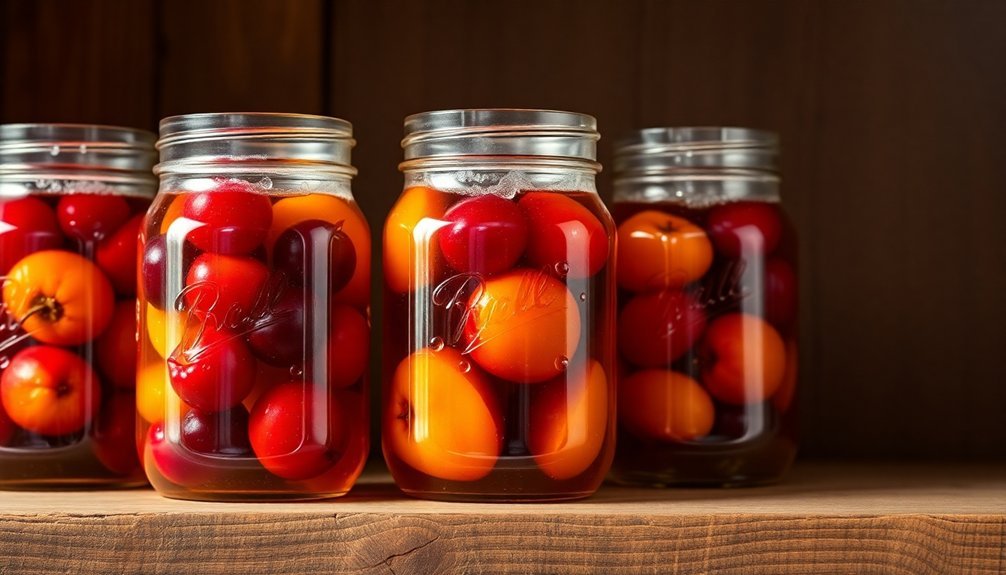
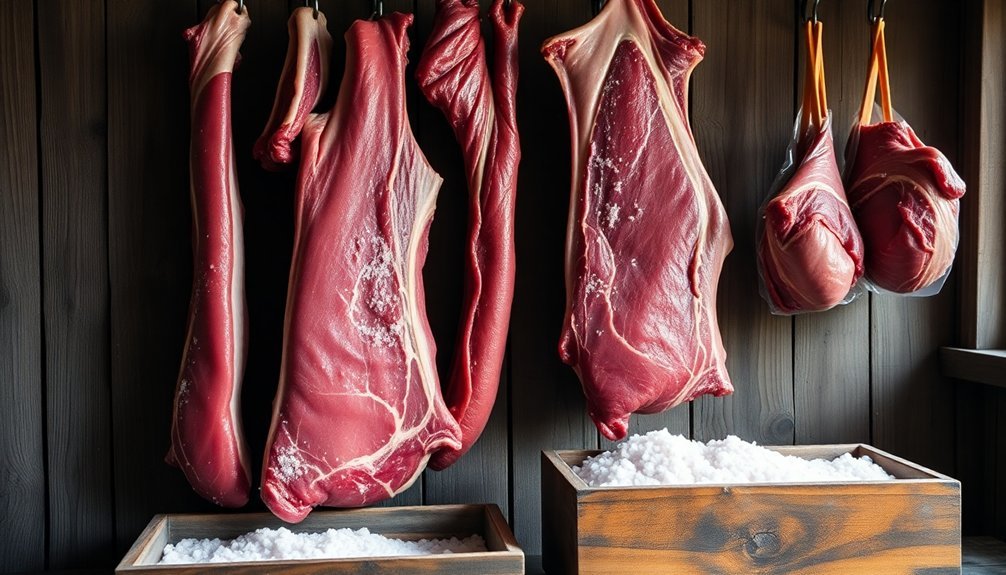
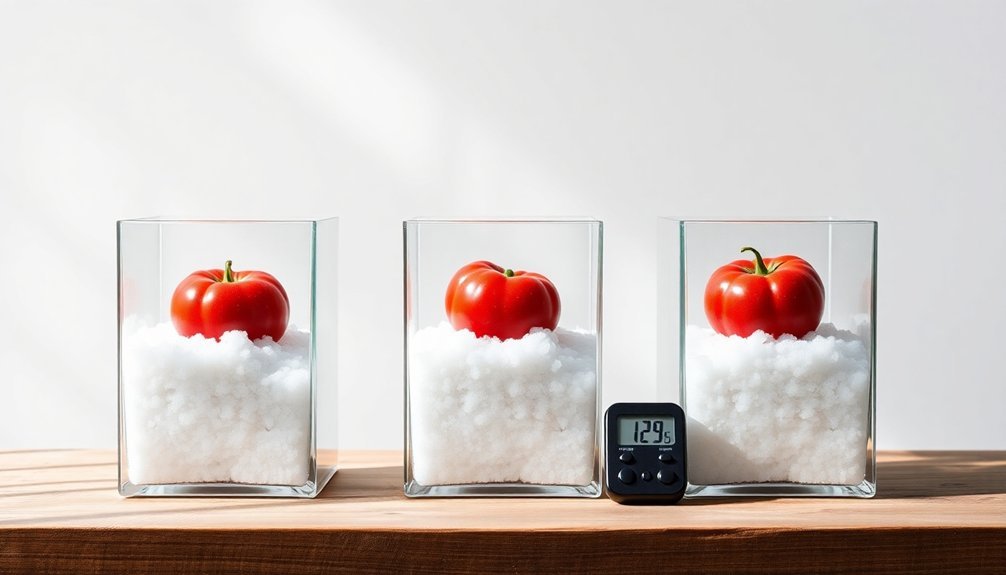
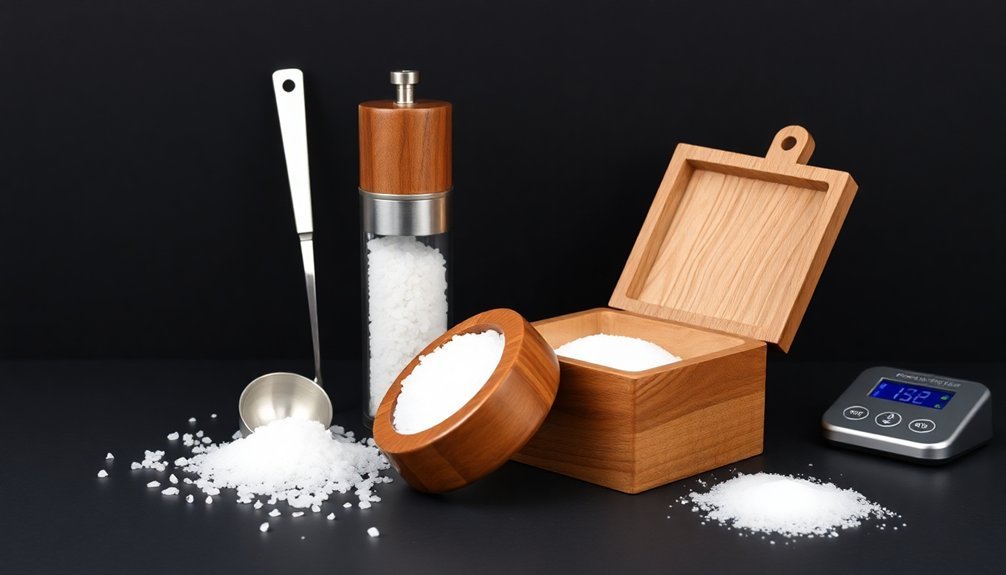
Leave a Reply